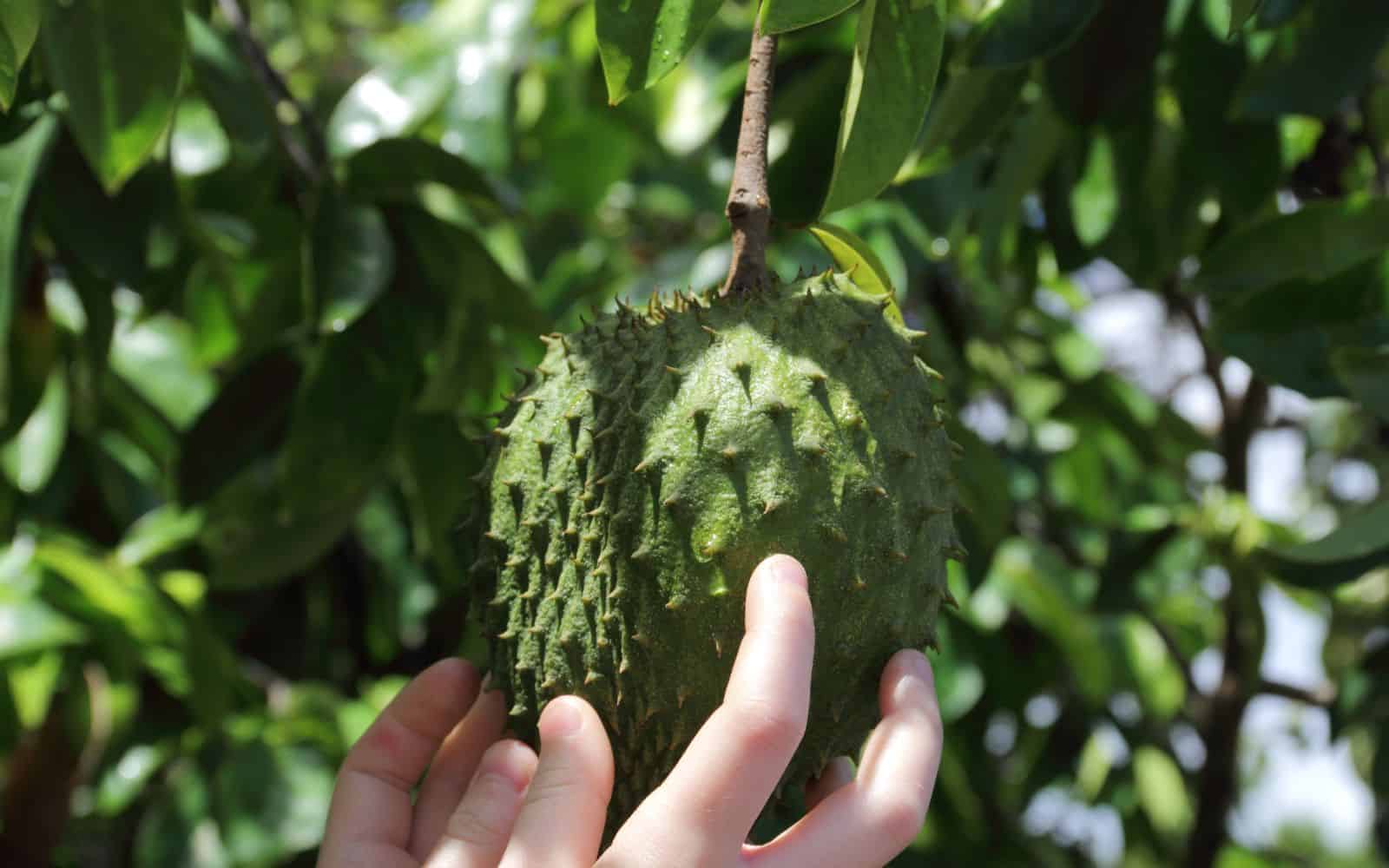What Is Soursop Tea Good For: Ultimate Guide

Disclosure: This post may contain affiliate links. If you click on a link we may make a small commission at no extra cost to you. You can read the full disclosure here
What Is Soursop Tea Good For
Soursop tea is a beverage made from the leaves of the soursop (Annona muricata) tree. The tea has a sweet, earthy flavor and is often brewed with other herbs, such as chamomile or lavender to enhance the taste and boost the health benefits. Soursop tea is believed to have anti-inflammatory, antioxidant, and anticancer properties.
How Do You Make Soursop Tea
To make soursop tea add the leaves to a pan and bring to a boil. Once the water has boiled, turn off the heat cover, and leave to steep for about 5 minutes. Strain, then sweeten as desired and serve for this unique brew.
The irregular heart-shaped soursop fruit is easily identifiable with its green color and spiky exterior and white, creamy flesh. It has many different names such as Graviola tea, Guanabana, Paw-paw, and Custard apple. Its taste is often compared to sweet pineapple or mango with slightly sour citrus notes. It can be used to make juice, smoothies, candies, and ice cream and is also used in traditional medicine in the treatment of a variety of conditions – so let’s explore exactly what is Soursop tea good for.
7 Purported Health Benefits Of Soursop Tea

Soursop fruit is native to the tropical regions of the Americas and the Caribbean and is harvested to produce a variety of items including cooking oils, herbal medicines, and soap. Soursop tea is brewed from the dried leaves of the soursop plant and is completely caffeine-free.
It is purported to have a variety of benefits, including reducing inflammation, boosting the immune system, and fighting cancer. Some small studies have shown that soursop tea may even help improve blood sugar levels in people with diabetes and help protect against diabetic complications, as well as being helpful for weight loss. However, more research is needed to confirm these benefits for its wide adoption as alternative medicine.
1. Digestive Health Benefits
The antiviral and anti-parasitic properties of soursop tea have been used traditionally as a source of relief for a variety of stomach problems. Soursop fruit is also high in fiber which helps to promote regularity and prevent constipation, which is linked with a reduced risk of certain cancers. The combination of these properties makes soursop fruit an effective remedy for many different gastrointestinal complaints and may also help protect against damage to the digestive tract.
Soursop is also a diuretic and may aid in the removal of toxins from the body which may aid in the reduction of bloating. In addition to its nutritional benefits, Soursop juice is also considered very refreshing and may help to reduce fatigue and build energy levels.
2. Immune System Benefits
Soursop fruit and leaves are high in vitamin C and other antioxidants such as tannins which are known to support immune health and protect against disease. Tannins are naturally occurring compounds that are well-known for their antimicrobial activities and may also stimulate immune system responses. Many choose to drink soursop tea as a preventative measure to help them fight the flu and other illnesses as it has a powerful anti-viral and antibiotic effect so it’s no wonder that many people choose to add soursop to their diet.
3. Anti-inflammatory Benefits
The anti-inflammatory benefits of soursop tea come from the tea’s high levels of antioxidants. Drinking soursop tea regularly may help to reduce inflammation throughout the body, leading to better overall health. The antioxidants in soursop tea help to protect the body from oxidative stress, which is linked to a number of serious diseases such as cardiovascular disease, cancer, and Alzheimer’s.
4. Blood Pressure Benefits
Soursop tea is a good source of vitamins and minerals including vitamin C, potassium, and magnesium. The combination of potassium and magnesium can help to relax the walls of the blood vessels which helps to lower blood pressure. Soursop tea is also a good source of iron which is important for the production of hemoglobin, a compound in red blood cells that carries oxygen throughout the body. These minerals work together to lower high blood pressure.
5. Antibacterial Benefits
Soursop tea potentially has antibacterial properties that may help to fight bacterial disease. In laboratory studies, soursop was found to inhibit the growth of several types of bacteria including those that are responsible for causing oral diseases. While more research is needed to determine if soursop tea can be used to effectively treat bacterial infections, these findings suggest that it has possibilities for use in this area.
6. Pain-Relieving Benefits
Soursop tea has been traditionally used as a folk remedy for pain relief. There is some preliminary evidence to suggest that soursop tea may help to reduce pain. The tea contains compounds that have anti-inflammatory, antispasmodic, and analgesic properties, which may help to relieve tensions and spasms. Additionally, its rich source of antioxidants may also help to reduce inflammation and pain.
7. Anticarcinogenic Benefits
Some preliminary research suggests that extracts from the soursop fruit may have anti-cancer properties. However, most studies were limited to test-tube research, so although soursop may have potential benefits in this field it is not yet known if these effects will be observed in humans.
Potential Side Effects Of Soursop Tea

The side effects of soursop tea are largely unknown due to the lack of scientific research on the subject. However, some potential side effects could include upset stomach, diarrhea, and headaches. Additionally, soursop leaves contain compounds that could potentially be toxic if consumed in large quantities. In fact, some studies have shown that the fruit and tea made from the leaves may have the ability to cause symptoms similar to neurodegenerative diseases such as Parkinsonism.
Additionally, soursop tea may interact with certain medications such as blood thinners, b/p, and diabetes medications. This is believed to be due to the fact that the compounds found in the fruit may strengthen the effects of certain medications, or interfere with their efficacy causing dangerous drops in blood pressure and blood sugar levels.
🚨 It is important to consult with a healthcare professional before consuming soursop tea or any other products made from soursop leaves.
Soursop Tea Alternatives

There are a few different types of tea that offer similar health benefits to soursop tea. Some of these include ginger tea, chamomile tea, and green tea. Each of these teas has its own unique set of health benefits, but they all offer some benefits that are similar to those of soursop tea. For example, all three of these teas can help to boost the immune system, improve digestion, and reduce inflammation.
1. Digestive Health Benefits
My number one choice of tea for digestive health will always be a cup of refreshing peppermint. Peppermint tea has long been used as a natural remedy for digestive issues like indigestion, nausea, and gas. The main active ingredient in peppermint, menthol, is thought to relax the muscles of the digestive tract, making it easier for food and gas to pass through. Peppermint tea is also a good source of antioxidants and has anti-inflammatory properties that can help to soothe an upset stomach.
2. Immune System Benefits
Some of the best teas that are known to boost the immune system include ginger, turmeric, and green tea. These teas can help fight off infection and improve overall health.
3. Anti-inflammatory Benefits
There are a few different types of teas that have anti-inflammatory properties. Some of the best ones include ginger tea, turmeric tea, chamomile, and green tea. Ginger tea is a popular choice for those looking for an anti-inflammatory tea because it contains gingerol, which is a substance with powerful anti-inflammatory and antioxidant effects.
4. Blood Pressure Health
There are many teas that can help promote healthy blood pressure levels. One of my favorites for this purpose is hibiscus tea with, ginger tea, and green tea following close behind. Hibiscus tea is rich in antioxidants and has been shown to help lower blood pressure levels.
5. Antibacterial Benefits
Some teas with antibacterial properties include ginger, turmeric, cloves, and cinnamon. In general, these teas work by inhibiting the growth of bacteria or by destroying their cell walls.
6. Pain-Relieving Benefits
When it comes to pain relief, there is one type of tea that stands out from all the rest for me – ginger tea. It is with good reason that it has long been used as a natural remedy for pain relief. Ginger tea is a great way to help relieve muscle soreness, alleviate joint pain and inflammation, manage nausea, and even boost your immune system.
7. Anticarcinogenic Benefits
Green tea contains naturally occurring compounds such as catechins and polyphenols. Polyphenols are a type of phytonutrient, which are plant-based nutrients that have been shown to have a variety of health benefits. Green tea is a particularly good source of polyphenols, and research has suggested that these compounds may play a role in cancer however, this research is far from conclusive.
Conclusion
Soursop tea has a variety of benefits that make it a popular choice for many people. Some of the benefits of soursop tea include its ability to boost the immune system, improve digestion, and help with weight loss. Additionally, soursop tea is also said to be helpful in treating various health conditions such as cancer, diabetes, and hypertension. While soursop tea does have many benefits, there are also some drawbacks to consider.
Overall, soursop tea may be a helpful addition to your diet but it is important to be aware of the potential side effects before consumption.
How Often Can You Drink Soursop Tea?
Soursop tea can be consumed on a daily basis and 1-2 cups are generally considered safe for most people. However, it is important to consult with a healthcare provider before consuming soursop tea if you have any underlying medical conditions or are taking any medications. Additionally, it is important to be aware of the possible side effects of consuming soursop tea, which include gastrointestinal upset.
Is Soursop Tea Good For Weightloss?
There is some preliminary evidence to suggest that soursop tea may be effective for weight loss as it contains compounds that may boost metabolism and suppress appetite. In one study, rats that were given soursop tea extract lost significantly more weight than those that were not given the extract. However, more research is needed to confirm these effects in humans.
Who Should Not Drink Soursop Tea?
There are certain groups of people who should not drink soursop tea. These include pregnant women, nursing mothers, young children, and those with pre-existing medical conditions. This is because there is not enough research to determine whether it is safe. Additionally, soursop tea may interact with certain medications, so it is important to speak to a healthcare provider before consuming it if you have any underlying health issues.






